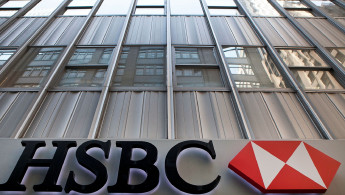HSBC UK bank account closures linked to UAE
A year after HSBC closed down the bank accounts of several UK Muslim institutions and individuals, the BBC and Middle East Eye have published research showing how the bank made its decision.
The research links HSBC's actions to the UAE's decision to brand some of its political opponents, including the Muslim Brotherhood as 'terrorists'.
Those affected include Mohammed Kozbar, chairman of the Finsbury Park Mosque, and the Cordoba Foundation, a UK based think tank that says it specialises in building relations between the Muslim world and the West.
All received a letter dated 22 July 2014 saying their bank accounts would be closed.
The letter to the Finsbury mosque read: "HSBC bank has recently conducted a general review and has concluded that provision of banking services to Finsbury Park Mosque now falls outside of our risk appetite."
The letter gave no further information and no right to appeal. Kozbar said the mosque had had no previous problems with the bank.
Anas Altikriti, chief executive of the Cordoba Foundation, who had banked with HSBC for 30 years, had his personal bank account closed, along with his wife's and two teenage children. He also was given no right to appeal.
Anna Meisel and Peter Oborne, who is editor of the UK magazine The Spectator, launched an investigation into why HSBC had decided to close the accounts.
They discovered the bank's decision was based on information provided by World-Check, a confidential database of politically-exposed persons owned by Thomson Reuters.
Reportedly, 49 of the world's largest 50 banks use World-Check to decide who to take on or retain as clients, to help ensure their clients are not financing terror or money-laundering.
| HSBC's decision was based on information provided by World-Check, a confidential database of politically-exposed persons. |
When the researchers accessed the database through one of its clients and searched for the Cordoba Foundation the word 'terrorism' flashed up in red. The website sourced its claim to the UAE that lists the foundation as a terror group.
World-Check also included Finsbury Park mosque in the 'terrorism' category, citing in detail the time when it was under the control of radical cleric Abu Hamza, who has been sentenced to life in prison in the US on terrorism charges.
However, for the last ten years the mosque has been run by a new management committee, approved by the metropolitian police.
The World-Check website reportedly contained several strong disclaimers, and stressed the "accuracy of the information found in the underlying media sources should be verified with the profile subject before any action is taken".
Profiles on the website are created from publicly available information. However the researchers argue: "it is not clear that banks can always reach an informed decision about clients based on the World-Check information."
The researchers also questioned the sources used to create the profile. They discovered information had been gathered from sources that include Wikipedia, and blogs - such as Muslim Brotherhood Watch - and the news agency WAM that are close to the UAE government.
World-Check, however, told the researchers: "World-Check uses only reliable and reputable public domain sources (such as official sanctions lists, law and regulatory enforcement lists, government sources and trustworthy media publications) for risk-based information or allegations about an individual or entity.
"We also provide secondary identifying information on individuals, such as dates and place of birth, and this will be similarly verified with reputable and official sources. If blog content appears, it is only as a supporting source for that secondary information, and is clearly identified as such."
The researchers also found links between the closures and David Cameron’s decision to review alleged Muslim Brotherhood links with terrorism in April 2014. Three months later HSBC sent its letters to well-known British Muslim organisations and individuals.
A senior government official told the researchers: "There is a definite connection between the bank account closures and the review of the Brotherhood."
The researchers argue: "By sending the message to law-abiding Muslims that they are excluded from the simple privileges enjoyed by all other British people, we risk encouraging rather than suppressing extremism."





 Follow the Middle East's top stories in English at The New Arab on Google News
Follow the Middle East's top stories in English at The New Arab on Google News


